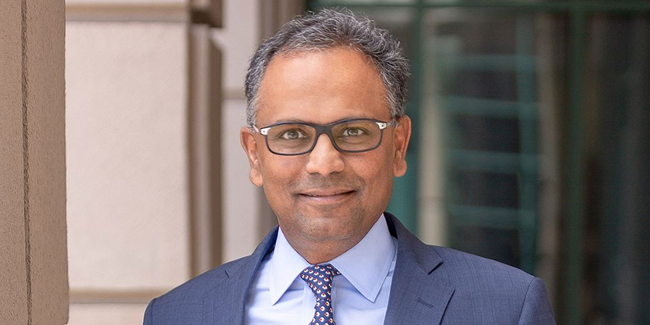… as mean reversion gets nearer, or not
For a slightly different take on the same theme, GQG Partners, another US-based global manager, says that, to a certain extent, everyone is a value investor. No-one wants to over-pay for stocks, whether they seem ‘cheap’ or ‘glamourous’. Entry price is important across all styles.
Rajiv Jain, the GQG founder, chair and CIO, says in his latest note to clients that he feels like he’s in the famous Samuel Beckett play ‘Waiting for Godot’. GQG’s style is quality with a growth bent but he keeps an eagle eye on what’s happening with value.
“Let’s go.” “We can’t.” “Why not?” “We’re waiting for Godot.” Samuel Beckett wrote in ‘Waiting for Godot’. In his 1953 ‘absurdist’ play, Jain says, two characters, Vladimir and Estrogan, spend the entirety of the play waiting around for the mysterious Godot (spoiler: Godot never shows). Despite having no clue what they are waiting for and waxing philosophical for hours over what they should be looking for, they could not bring themselves to leave the scene for fear of missing out on the mysterious Godot.
“We do not think that Beckett had the asset management industry in mind when he wrote his play, but he might as well have. In our view, many investors are playing the role of Vladimir and Estrogan – waiting around for Godot, played by the ever-elusive value factor whose past outperformance refuses to show,” Jain says.
“For value investors, generally, it has been a tough row to hoe over the last decade, on both the active and the passive side of things. As quality growth investors, we recognise that in polite society it is a well-observed tradition that one should not kick another while they are down. However, in the spirit of disruption, we are going to break with tradition…
“While we can debate the highly uncertain global impact of Covid-19, what is not up for debate is the performance of the traditionally defined value factor which, to be blunt, has been abysmal. Certainly, it appears that some market participants were panicking during the recent market sell off (we were not). In our view, the folks who should be in a panic are those investors suffering from value’s relative underperformance, he says.
“In that regard value style investing has now underperformed on a monthly, YTD, one, three, five and 10-year basis, as measured by the performance of the Russell 1000 Value Index versus both the Russell 1000®Growth Index and the Russell 1000 Momentum-Focused Factor Index. If your exposures did not provide relative upside in good times and did not reduce the relative downside in the bad times, much like war, what are they good for?”
Why hasn’t Godot ever showed?
Now, we fully recognise that as of March 2020, everyone knows that traditional value has had a rough go of it since the global financial crisis (GFC). However, few investors seem to have figured out the “why” of this underperformance. Despite the poor returns and lack of apparent rationale for those poor returns, the popularity of value stocks, as evidenced by recent Google Trends data, is approaching an all-time high since Google started collecting the data back in 2004.
Unfortunately, the all-time high in popularity, September 2008, was not exactly the best time to become a value investor. But let us give credit where credit is due, and while value has underperformed for a decade at this point, one of the cases for buying cheap assets is that they hold up better in a drawdown, something that has not occurred very often in a post-GFC world.
Between 2007 and 2018, value stocks remained value stocks for three-and-a-half years while glamour stocks remained glamour stocks for four-and-a-half years.
“Going back to mean reversion, in our view this would suggest that the fundamental differences, rather than the transitory differences of our buckets have changed. In fact, much of the relative underperformance, in our view, stems from the fact that estimated earnings growth for the Russell 1000 Value Index today is lower than it was in 2006, while forward prices paid are actually higher,” Jain says.
“So, while the Russell 1000 Growth Index, is and was, at a premium, the ratio of prices paid for future growth actually improved relative to the value cohort, despite strong returns for the growth Index over the prior decade. While many investors are still waiting and hoping for mean reversion, we think few have looked at the data closely enough to understand why “value” has underperformed. Like many things in life, sometimes it might be best to cut your losses…
“Even the father of value investing, Benjamin Graham, never advocated for such a narrow approach to investing, stating: ‘the stock of a growing company, if purchasable at a suitable price, is obviously preferable to others’,” Jain says.
– G.B.











